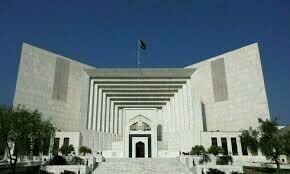President Arif Alvi’s completion of his five-year term on Friday may not culminate with an unblemished send-off, as Senator Raza Rabbani has issued a statement highlighting an alleged series of constitutional violations during his tenure as head of the state.
Nevertheless, despite the conclusion of his term, President Alvi is expected to remain in office indefinitely due to the absence of an electoral college necessary for the presidential selection process, according to a Dawn report.
This will make him one of the only heads of state in the country’s history to have an extended term, though Chaudhary Fazal Elahi also spent an additional month in office as a figurehead before Ziaul Haq became president on Sept 16, 1978.
Under the law, the president is elected by members of both houses of the parliament — i.e. the Senate and the National Assembly — and the four provincial assemblies.
With the general elections’ outcome still shrouded in mystery and the Election Commission’s contemplation of holding them in late January, it’s uncertain how much longer Alvi will hold his position.
Today, PPP Senator Rabbani issued a statement, outlining over a dozen instances when President Alvi allegedly violated the Constitution.
According to the senator, promulgation of ordinances by the president “without application of mind was in contravention of Article 89(1) of the Constitution.”
Under Article 89(1) of the Constitution, “the President may, except when the (Senate or) National Assembly is in session, if satisfied that circumstances exist which render it necessary to take immediate action, make and promulgate an ordinance as the circumstances may require”.
It says that an ordinance promulgated under this Article shall be laid before the National Assembly or the Senate, whichever goes into session first and “shall stand repealed at the expiration of 120 days from its promulgation or, if before the expiration of that period a resolution disapproving” it is passed by any house of parliament “upon the passing of that resolution”.
Rabbani also referred to the appointment of two members of the ECP, in violation of the procedure and the Constitution. The president had made the decision in 2019.
He also called out the president for promulgating the Gas Infrastructure Development Cess (GIDC) Ordinance “against judiciary and with no inter-ministerial consultation”.
Similarly, another alleged violation of the Constitution involved the “re-promulgation of the PMDC Ordinance, which had been rejected by the Senate under Article 89 of the Constitution.”
He also castigated the president for a reference filed against two judges of the superior judiciary “without application of mind”.
The senator also pointed out that the president allegedly maintained “criminal silence over the withdrawal of the prosecution case in a matter of high treason”.
He also highlighted that the Islamabad High Court had, on Feb 4 and Feb 11, 2020, nullified the presidential orders that had dismissed the chairman and members of the Competition Commission of Pakistan, as well as the PMDC Ordinance that he had promulgated, respectively.
Rabbani also stated that the top court also quashed the reference sent by the president against Justice Qazi Faez Isa.
In addition to other purported violations, the senator also pointed out that the Supreme Court had dismissed the reference sent by the president against Justice Isa, who is scheduled to assume the position of Chief Justice of Pakistan later this month.
“The Balochistan High Court also set aside the NFC notification issued by the president,” Rabbani said.
He also called out the president for accepting an advice of the then prime minister Imran Khan for dissolving the National Assembly.
He also recounted an incident in which the president had reportedly declined to administer the oath to prime minister Shehbaz Sharif and his cabinet.
Rabbani was of the view that the president had also “not acted on the advice of the prime minister for the removal of the Punjab governor” in May 2022.
The lawmaker also blamed the president for “failing to nominate a person to administer oath of chief minister as per instructions of the Lahore High Court” — a reference to the oath-taking of then Punjab CM Hamza Shehbaz.
The legislator also held the president responsible for “neglecting to designate an individual to administer the oath of the chief minister in accordance with the Lahore High Court’s directives” – referring to the swearing-in of the then Punjab CM, Hamza Shehbaz.
He stated that the president had also purportedly neglected his constitutional obligation under Article 75 of the Constitution “by neither granting assent nor returning two bills to the parliament, instead placing the blame on the presidential staff.”
Rabbani also said it was president’s “mala fide intent by misinterpreting Article 48 of the Constitution for the announcement of the general election’s date”.
He made this reference in connection to President Alvi’s invitation to the chief election commissioner for a meeting aimed at “determining a suitable date” for the general elections.














































Dear visitor, the comments section is undergoing an overhaul and will return soon.